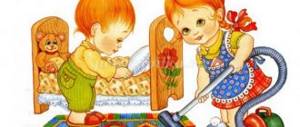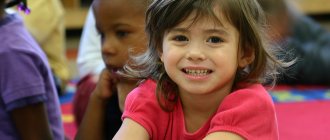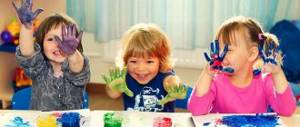Interest in the education of spiritual and moral personality has never faded. But at the beginning of the 21st century, when socio-economic relations came to the fore, the attitude towards moral and value norms and human behavior in society also changed.
The greatest danger that lurks in the modern world is the degradation of man as an individual.
Joint parent-teacher meetings with children are an effective educational method.
Features of moral education
Negative features began to appear in spiritual and moral education: computers and thoughtless TV watching pushed books into the background, live communication was replaced by virtual SMS.
The material side of life began to dominate over the spiritual, so children’s idea of kindness, mercy, compassion and patriotism was distorted.
What is spiritual and moral education - components?
Education of morality in a child is based on the interaction of three main pillars: a general educational institution or kindergarten, the family and the child himself. At the present stage, the leading position is occupied by the teacher-parent interaction. It consists of sharing experience, knowledge, thoughts and experiences.
Families and kindergarten are two priority places where the full formation of a person as an individual takes place.
Moral foundations are the goal of spiritual and moral education
Family is the key to moral education
The weak point in the formation of correct moral ideas is the family. Many parents do not even suspect that already in preschool age, children begin to form social norms, moral requirements and various patterns of behavior in the course of imitation, most often by parents. Therefore, the main task in moral education is to convey to the family that it is in it that the customs and family values passed on long ago and the new ones created by them should be preserved and transmitted. It is necessary to convey that the family is responsible for raising children.
Family values are the basis of spiritual and moral education
New, modern traditions include a family Saturday evening, a joint trip to the skating rink, or to the cinema. An excellent solution would be to choose a family holiday that will be meaningful specifically for this family. It could be New Year, birthday or March 8th.
Advice: You need to spend as much time as possible communicating with your child. Read books to him, watch cartoons together, take an interest in his life and hobbies.
Stills from good cartoons
When watching cartoons, it is better to give preference to good Soviet cartoons rather than modern American ones. “The influence of modern cartoons on the development and upbringing of children” will be an excellent topic for the next parent meeting or consultation.
Consultation for parents “Moral education of a preschooler in the family”
Anna Bychkalova
Consultation for parents “Moral education of a preschooler in the family”
«Moral
raising a preschooler in a family»
(Consultation for parents)
A child is a mirror of the family ; Just as the sun is reflected in a drop of water, so the moral purity of the mother and father is reflected in the children. /Vasily Sukhomlinsky/.
What do we mean when we talk about moral education ?
Moral education is the education in children of high spiritual and moral principles, a sense of patriotism for the Motherland , special regulation of ways of thinking and behavior accepted in civil society.
It is important to explain to him how to benefit people well. At the same time, it is also necessary to convey that actions are important, and not just talk about goodness. To awaken spiritual feelings in a preschooler , parents introduce their children to the sights of their city, village, tell them about the work of adults, about their work, about nature, about the places where the child was born and lives .
The moral education of preschoolers is carried out in various spheres of their lives and activities. The child experiences moral influence in the family , among peers, on the street. Often this influence is not adequate to the requirements of morality.
An urgent task at present is to educate preschoolers with moral and volitional qualities : independence, organization, perseverance, responsibility, discipline.
The formation of the moral-volitional sphere is an important condition for the comprehensive education of the child’s personality . is raised morally and volitionally .
Underestimating the importance of nurturing strong-willed qualities from an early age leads to the establishment of incorrect relationships between adults and children, to excessive care of the latter, which can cause laziness, lack of independence in children, lack of self-confidence, low self-esteem, dependency and selfishness.
The research work of scientists on studying the psychology and capabilities of preschool children shows that preschool great potential in matters of educating their morality . Children's consciousness is able to control their behavioral abilities, such as active behavior, independence in their actions and choices, and the manifestation of a certain interest in the environment. Older preschoolers are capable of collectivization, where feelings of friendship and camaraderie are already manifested in their joint actions. The more a child sees correct actions and deeds, and the more often he hears positive things, the higher his moral education . Observations show that many parents tend to underestimate the volitional capabilities of their children, distrust their strengths, and desire to patronize. Often, children who demonstrate independence in kindergarten become helpless, insecure in the presence of their parents , and become lost when difficulties arise in solving feasible tasks. Adult family are concerned about the problems of preparing a child for school, but they are primarily interested in issues of social training - learning to read, count, write, but parents to the development of such qualities as independence, perseverance, responsibility, organization . It is known that the family plays a leading role in moral education . A normal, prosperous family is characterized by an atmosphere of related emotional ties, richness, spontaneity and openness in their expressions of love, care and concern. If a child is surrounded by love, feels that he is loved no matter what he is, this gives him a feeling of security, a sense of emotional well-being, he realizes the value of his own “I”
.
All this makes him open to goodness, a positive influence. Respect for the child’s personality, recognition of the value of his inner world, his needs and interests contribute to the development of his self-esteem.
A person deprived of this feeling will allow both himself and another to be humiliated, to allow injustice. Self-esteem helps the child to correctly evaluate his actions and the actions of others from the point of view of their humanity: he himself acutely feels humiliation or injustice, he can imagine how painful it will be to another. In conclusion, it should be noted that the moral education of preschool children is based on a strong perception of the attitude of adults towards them. They want to be treated attentively and kindly, understood and loved. Preschool children , when doing good or bad things, do not think about whether they are good or bad. Their actions are assessed by parents or educators , giving their actions a positive or negative connotation. IMPORTANT! Under no circumstances should you allow your children to do anything that will later be prohibited!
Tasks, forms and goals of spiritual and moral education in the family
The tasks that parents should set for themselves are simple:
- teach children to distinguish between good and evil, teach them to do good and be merciful;
- to form a feeling of respect and love for one’s Motherland;
- to focus on the moral education of preschool children in the family, by introducing them to the traditional foundations of the family.
The essence of spiritual and moral education in the family
Forms of work with parents on spiritual and moral education in the family:
- parent meetings on spiritual and moral topics;
- evening discussions;
- open demonstration performances by teachers;
- attracting parents for joint activities: holding exhibitions, competitions, theatrical performances;
- individual consultative meetings with specialists: psychologist, teacher and educator;
- excursions with children;
- active participation of parents in the life of a kindergarten or school (assistance in landscaping the site, minor repairs, joint preparation of holidays)
- shared leisure time with the parent.
When conducting spiritual and patriotic education together with parents, it is necessary to set the following goals: developing in children a positive attitude towards people and the world around them; acquaintance with the ability to show compassion for people; learn to take responsibility for your actions.
Working with parents - joint activities
Consultation for parents “Spiritual and moral education in the family”
Anna Belunis
Consultation for parents “Spiritual and moral education in the family”
Spiritual and moral education of preschool children in the family
The real desire for family happiness and family well-being is expressed in the creation of family traditions. Once upon a time, traditions were a mandatory feature “joint”
family and reflected the moral position of its members. Some traditions can be completely adopted by a modern young family .
Early involvement of children in discussing all issues of family life is a long-standing good tradition. In some families, it has become customary to discuss the events of the past day over evening tea, when the whole family . Mother and father talk and exchange impressions. This opportunity is also available for children. Plans for the distant and near future are discussed together. The tradition of nightly readings, discussions of what has been read, free expression and exchange of opinions is very useful.
The custom of spending summer holidays together is becoming increasingly popular ( “Don’t part with your loved ones!”
).
The best school in life is analyzing your own mistakes. If this has become a rule in the family , children, of course, become accustomed to the manner of obligatory, impartial analysis of their actions.
There is a lot of literature on raising children , about relationships in the family of the younger and older generations, and many other different literatures. I think everyone wants their home to be cozy, hospitable, unique, so that no matter where one of the family , he knows that they are waiting for him at home, they will always listen and understand, and help in difficult times. also be traditions in the family that my children should adopt and transfer to their future families .
Family traditions are the spiritual atmosphere of a home , which is made up of the daily routine, customs, way of life and habits of its inhabitants. Thus, some families prefer to get up early, have a quick breakfast, go to work and meet in the evening without asking questions or talking. In other families, it is customary to have meals together, discuss plans, and there is increased attention to each other’s problems.
In each house, during its existence, its own ritual develops. The house gets used to its residents and begins to live at their rhythm. Its energy structure changes somewhat under the influence of traditions. After all, by and large, traditions are not only the family way of life, but also the relationships that develop between family . It is these relationships that the house captures. If a family sets traditions for themselves as obligatory, then they can do a good job. Often following traditions helps us live. And no matter how strange they may seem, one thing is important: family traditions and rituals should not be cumbersome and far-fetched. Let them come into life naturally.
It is extremely difficult to form a family tradition if the children have grown up and have already formed a common attitude towards the family . Another thing is young families , where parents are free to show the child all the beauty of the world, envelop him with love and form a reliable position in life throughout his life.
A small child perceives the world through the eyes of adults - his parents . Dad and mom form a child's picture of the world from the very first meeting with their baby. First, they build a world of touches, sounds and visual images for him, then they teach him the first words, then they convey their attitude to all this.
How a child subsequently treats himself, others and life in general depends entirely on the parents . Life may seem to him like an endless holiday or an exciting journey, or he may see it as a frightening foray into wild places or as boring, thankless and hard work awaiting everyone right outside the school gates.
If most of the usual family rituals do not carry restrictions, but only joy and pleasure, this strengthens in children a sense of family , a sense of the uniqueness of their own home and confidence in the future. That charge of inner warmth and optimism that each of us carries within us is acquired in childhood, and the greater it is, the better. Of course, a child’s character is not formed in one day, but we can say with confidence: the more childhood was like a holiday, and the more joy there is in it, the happier the little man will be in the future.
Start small - reading at night. Even if your child is still too small to understand what you are saying to him, just the sound of your voice will be incredibly useful for the baby. Try to take time to choose fairy tales; for example, Andersen’s fairy tales can hardly be read to children, since these books were written for his friends, adults and mature personalities. Every book should teach a child, educate him .
If necessary, you can compose evening stories yourself. Firstly, it will not take you much time (20-30 minutes a day, since the fairy tale should not be long so that the child does not get tired. Secondly, you can teach him yourself what you consider good. For example, a fairy tale about how a boy didn’t wash and lost all his friends, and then a sorceress brought him peach-flavored soap, and he became clean and his friends came back again. There are hundreds of options! Imagine the joy of your already grown-up son when he turns 18 On your birthday, you will give him a collection of fairy tales written by you and listened to by him in childhood - this is a real “golden” gift.
And also family traditions and rituals:
- allow the baby to feel the stability of their way of life: “whatever the weather”, will happen in your family ;
- give him a feeling of confidence in the world around him and security;
— set the baby up for optimism and a positive perception of life , when “every day is a holiday”;
- create unique childhood memories that the baby will someday tell his children about;
- allow you to feel proud of yourself and your family .
You are quite capable of creating several family traditions that your children and grandchildren will probably adhere to! Don’t forget just three main rules:
a repeating event should be bright, positive, and memorable for the child;
Tradition is a tradition to always be observed;
you can use smells, sounds, visual images - the main thing is that in this traditional action there is something that influences the child’s feelings and perceptions .
Some families do not have their own family traditions and family holidays. You should not refer only to the acute shortage of time. This reason is superficial, the truth is much simpler and sadder: probably these people have nothing to talk about among themselves, it is a burden for them to often see their loved ones. And this is a symptom of severe functional impairment in life at home. Such a house is not at all durable.
What can family holidays and rituals be like?
Instead of the usual “hello-bye”, a friendly family can agree to greet each other with a special “code” word, understandable only to “their own”! For example: “Hello, hero!”
or
“Hello, princess!”
It’s funny if, when saying hello, someone says the first half of the word, and his interlocutor says the second. You can also come up with special forms of farewell - like funny wishes or advice to each other for the whole day.
There is great scope for creating family traditions in the kitchen and culinary talents of one of the family .
It's great if everyone gets together for a family lunch or dinner on the weekends. The main thing is that this should not be a dull eating of delicacies, but be remembered by the clink of glasses, the appetizing smell of delicious dishes and the smiles of household members.
It will be even more interesting if you give your child the opportunity to master his “signature dish,” which will take pride of place on the table. Or invite him to learn something new together every Sunday. Kitchen experiments are good for babies because the result is always visible, tangible and... smells very tasty!
You can also organize celebrations of “national” cuisine - one or a variety of them! This way, the baby will be able to learn a lot of new things about the world around him and master the exotic wisdom of behavior at the table - for example, how to hold chopsticks or... drink from a saucer.
You may be surprised, but the best tradition associated with a child’s birthday is... really celebrating this day as the best holiday! Many adults sadly recall that in their family “it was not customary to celebrate birthdays.” Let your baby never utter this sad phrase!
A birthday as a noisy, cheerful holiday with exactly those guests whom the hero of the occasion himself wants to invite is the best gift. Let the baby feel his importance to loved ones from childhood, learn to receive guests and... of course, get used to the tradition of celebrating birthdays!
And for adults, this holiday is an occasion to fantasize about special rituals. In many families, it is customary to mark the child’s growth on a special ruler. You can trace the baby’s arms and legs every year or create a photo gallery. In a word, to do something that will help him later remember his childhood.
Together with your child, you can start drawing up a family tree or start collecting some kind of collection; the scope for imagination is limitless! The main thing is to feel that it is truly “yours” and brings joy to all family .
Regardless of whether you are trying to preserve old home traditions that are dear to you or your husband, or are trying to come up with and instill in the family something new , remember that childhood shapes a child for life. And the main thing in childhood is that the child has it. Try to know when to stop: overly strict rules by which the family , which do not leave children any “freedom of maneuver”
, overstrain the child’s psyche. The absence of a stable home structure and predictable home rituals, which calm the baby with their indispensable obligation, conveys to the child a feeling of insecurity at home and the precariousness of the universe.
It is worth remembering that any rules are good if they make life better, and do not complicate it. Rigid traditions, even if they do not regulate everyday life, but only holidays or other joyful events, have a depressing effect on the spontaneous child’s psyche. Some events in life should simply be allowed to happen without making them fit into a script.
We wish you comfort and warmth in your home!
Educational institution as a means of spiritual and moral education
Before starting educational work with parents on the moral education of children, it is necessary to carry out diagnostic measures. Identify problem areas and topics that interest parents the most. More often, parents are interested in sensitive periods, crisis leaps in development, and the preschooler’s readiness for school.
Forms of work on spiritual and moral education
During socialization classes, it would be appropriate to introduce children to the professions of their relatives. To form in them a conscientious attitude towards any business.
An excellent holiday where children and parents will directly interact will be: a sports and entertainment holiday on February 23 and a Mother's Day on March 8.
Matinees for younger schoolchildren - one of the methods of education
Important: parents of children of senior preschool age (6 years old) should remember that the level of development of the cognitive and emotional-volitional spheres remains still at the level of a younger preschooler, where the main activity is still play. Try to convey serious things in a playful way.
Consultation for parents “Spiritual and moral education of preschool children”
Consultation for parents
“Spiritual and moral education of preschool children”
Labonina N. E.
“Without memory there are no traditions, without tradition there is no education,
Without education there is no culture, without culture there is no spirituality,
Without spirituality there is no personality, without personality there is no people!”
Preschool childhood is an extremely important period of personality formation. It is during these years that the foundations and primary ideas about the world around us, about ourselves, about people are laid. Children develop certain behavior, skills and habits, a certain attitude towards everything around them: towards people, towards nature, towards actions, towards work and so on. This is how character is formed! And what we put into the child’s soul now will manifest itself in his future life, and will certainly affect us, among other things, and will be reflected in society.
The basis of spiritual and moral education is the culture of the family, educational institution, society - that is, the environment in which the child lives, in which his development and formation take place.
Already in the preschool period, and even earlier, it is necessary to instill the skills of polite behavior, caring attitude towards toys, things, nature, everything. All this is instilled in the process of games, self-care work, observation, etc.
The essence of moral education is not the banal memorization of rules and habits of behavior, it is a process of self-determination, self-government in accordance with moral standards, it is communication and interaction, a process of activity, making certain decisions, overcoming contradictions! Senior preschool age is a crucial stage in the development of a person’s personality and behavior.
Moral values are closely related to moral qualities: benevolence, philanthropy, respect for people, their individuality, their opinions; patriotism, humanism, the desire to do good deeds, not repay evil with evil, ask for forgiveness and forgive in return, display tolerance; discipline, caring, compassion, conscientiousness, responsibility, hard work, honesty, fairness.
The family, as the primary educational institution, mainly influences the formation of morality. First of all, it is the parents who are the role model, and they, like no one else, form certain value orientations in the child, and then the social environment influences, especially kindergarten, etc. The younger the children, the more you can influence his feelings and behavior. First, an algorithm of social behavior is formed, and awareness of moral criteria occurs much later. The presence of knowledge does not yet indicate a conscious and sustainable positive attitude towards the world around us, so practice is needed: daily include the child in everyday situations - taking care of a brother/sister, pets, houseplants, helping parents, grandparents, etc. - that is, doing things within the child’s power, while observing all safety measures.
It is very important to introduce children to folk culture, folk traditions and customs. This contributes to the development of cognitive interest in children, awareness of themselves as part of their people, and instilling humane and patriotic feelings. Various observations accumulated over centuries - the weather, the behavior of birds, animals and insects are reflected in signs and customs - this is a huge source of information about people’s lives, their culture, work, worries, conditions, etc.
Fiction has a powerful influence on the consciousness, feelings and mind of a child. Children need to read fairy tales regularly! And not just read, but also discuss what you read. Due to little life experience, a child often cannot extract the main thing from a work, correctly evaluate and explain the actions of a particular character. Conversations about literature can reveal to a child the diversity of human characters, the complexity of relationships between people, and behavioral characteristics in various situations. With a word you can “inspire” a child and motivate him to do good deeds.
Success in the spiritual and moral education of preschool children depends on the coordination of efforts and unity of requirements of the kindergarten and family. There should be no differences of opinion: for example, careful attitude towards toys should be not only at home, but also with the property of the kindergarten, or with the toys of friends and peers; or basic table manners while eating should be observed at home too. Otherwise, all efforts to instill certain qualities in the child will be in vain.
Be attentive to your children, to their life in kindergarten, to their inner experiences! Be a support for them, a friend, an authority! Be a role model! Read fairy tales to children! And talk! Chat about everything in the world!
The relationship between moral and patriotic education
Spiritual and moral education is closely intertwined with patriotic education, because love for one’s home, city, and Motherland entails respect and love for one’s family. Currently, more and more families are trying to involve their children in learning about the history of their region and humanity in general. The right decision would be to watch photos, books, films together, visit ethnic museums, galleries, and thematic celebrations. Thematic celebrations include the celebration of Maslenitsa. It is this that allows you to visually and practically get acquainted with the traditions and customs of your people.
Patriotic education is one of the main components of spiritual and moral development
Children tend to commit rash, emotionally charged actions.
But against their background, it is still possible to see the positive dynamics in moral education. Children can already evaluate their actions and reactions, have learned to see the actions of other people, distinguish between good and bad deeds, and have developed the skill of showing mercy and responsiveness.
Cultivating love for the homeland - the relevance of experience
Nurturing spiritual and moral concepts is not a matter of one day or even a month.
This is the daily work of parents and teachers, aimed at developing tolerance and respect for family and native land.







